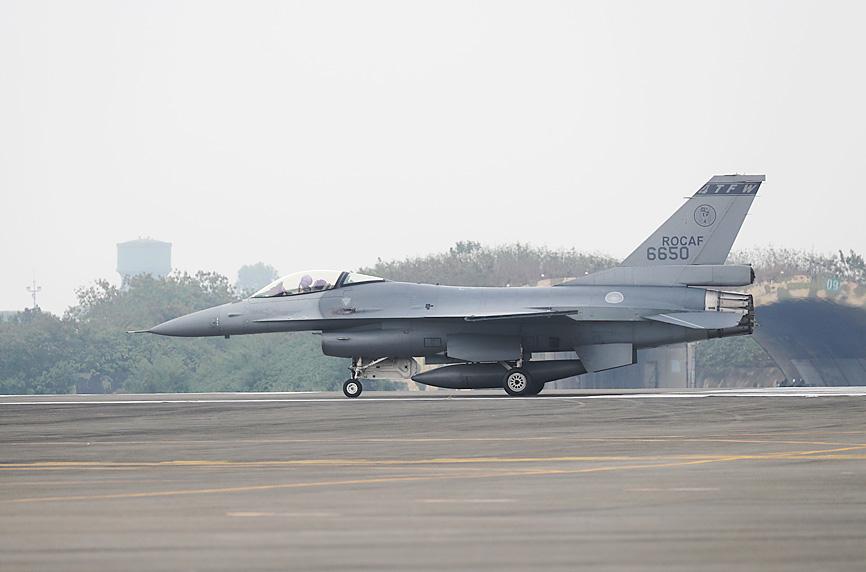The US Department of Defense on Monday said that it has no plans to send F-16 jets scheduled for delivery to Taiwan to Poland instead, calling speculation raised by a US media report “not accurate.”
The comments by Pentagon spokesman John Kirby followed a report in the New York Times on Sunday, which said that the administration of US President Joe Biden was exploring ways to supply Polish Soviet-made fighter jets to Ukraine to aid in its war against Russia, as Ukrainian pilots are more familiar with Russian-made jets.
One option was to send US-made F-16s to Poland as replacements, the report said, although “Polish officials seemed less than enthusiastic.”

Photo: CNA
With the next tranche of F-16s for export set to go to Taiwan, those fighter jets were an option, the report said, adding that US officials were reluctant to delay Taiwan’s F-16 program.
Asked in a CNN interview on Monday whether F-16 jets meant for Taiwan could be provided to Poland, Kirby replied: “That rumor is not accurate.”
However, he did acknowledge that Washington would not “stand in the way” if any nation did want to provide fighter jets to Ukraine.
In that regard, the US has started to have conversations about how it could “backfill,” or replace, jets transferred to Ukraine by another nation, including “what kind of aircraft, where would they come from and how do you get them,” Kirby said.
However, he said that the US did not have “any answers” at the moment and that there was “no proposal on the table.”
Meanwhile, White House press secretary Jen Psaki on Monday confirmed that the administration has been consulting with Poland and other NATO allies on the possibility of transferring jets to Ukraine, but said the decision was ultimately up to Warsaw.
Aside from the question of how to transfer Polish jets to Ukraine, the issue of providing replacement jets to Poland was also logistically complex, given that procuring new planes and transferring weapons systems often takes years, Psaki said.
Washington in 2019 approved the sale of 66 F-16Vs to Taiwan in an US$8 billion deal, with delivery expected to start next year and extend through 2026.
The 66 F-16Vs are to be deployed at Chihhang Air Base in Taitung County.
Meanwhile, Taiwan is also upgrading its F-16A/B jets to the more advanced F-16V format.

A woman who allegedly spiked the food and drinks of an Australian man with rat poison, leaving him in intensive care, has been charged with attempted murder, the Taipei District Prosecutors’ Office said yesterday. The woman, identified by her surname Yang (楊), is accused of repeatedly poisoning Alex Shorey over the course of several months last year to prevent the Australian man from leaving Taiwan, prosecutors said in a statement. Shorey was evacuated back to Australia on May 3 last year after being admitted to intensive care in Taiwan. According to prosecutors, Yang put bromadiolone, a rodenticide that prevents blood from

The unification of China and Taiwan is “non-negotiable,” China’s Taiwan Affairs Office (TAO) said yesterday in response to an article by a Chinese academic suggesting that Beijing would not set a timetable for the annexation of Taiwan in the next four years. Chinese international studies researcher Yan Xuetong (閻學通) at Beijing’s Tsinghua University wrote in an article published last week in Foreign Affairs that China’s focus for the next four years would be revitalizing the economy, not preparing a timetable to invade Taiwan. The TAO said that was only the personal opinion of an academic. The Chinese Communist Party has since 1949 committed

China is likely to focus on its economy over the next four years and not set a timetable for attempting to annex Taiwan, a researcher at Beijing’s Tsinghua University wrote in an article published in Foreign Affairs magazine on Friday. In the article titled “Why China isn’t scared of Trump: US-Chinese tensions may rise, but his isolationism will help Beijing,” Chinese international studies researcher Yan Xuetong (閻學通) wrote that the US and China are unlikely to go to war over Taiwan in the next four years under US president-elect Donald Trump. While economic and military tensions between the US and China would

US nuclear buildup would not help deter China from using atomic weapons in Taiwan, an unclassified war game by the Center for Strategic and International Studies (CSIS) and Massachusetts Institute of Technology (MIT) showed. The simulation was conducted in response to increasing talk among policy experts that the US should modernize its nuclear weapons to counter increasing Chinese capabilities, the CSIS said in a report on Friday last week. The tabletop exercise — the first large-scale unclassified simulation of a potential nuclear war over Taiwan — found that US nuclear capabilities beyond current modernization plans would have little effect on Beijing’s willingness